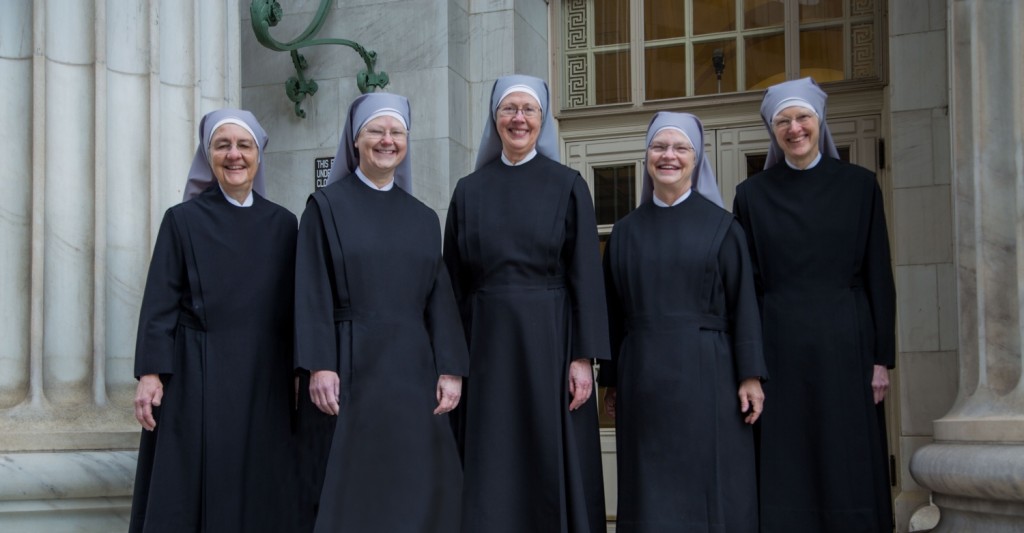
How Many Nuns Does It Take to Provide Women with Contraceptive Coverage? Precisely “Nun”
Chelsea Langston, April 28, 2016
On March 29th, 2016, the U.S. Supreme Court took the unusual action of requesting additional information from the parties in the case involving the Little Sisters of the Poor and other religious nonprofits. The Court ordered the nonprofits (the petitioners) and also the federal government to file supplemental briefs proposing acceptable alternatives to the current HHS contraceptives mandate with its disputed “accommodation.”
The Court required both sides to provide information by April 12 discussing “whether and how contraceptive coverage may be obtained by petitioners’ insurance companies, but in a way that does not require any involvement of petitioners beyond their own decision to provide health insurance without contraceptive coverage to their employees.”
In its supplemental brief, the Becket Fund for Religious Liberty, representing the Little Sisters, answered the question of whether the Court’s hypothetical example of an alternative would be acceptable with a resounding “yes.” The brief made clear that it would be acceptable if all that is required of religious nonprofits that contract with health insurance providers is to select a plan that does not provide contraception that the religious nonprofit objected to—leaving it entirely to the insurance companies to separately contact the religious non-profit’s employees and separately enroll them in a separate plan (with a separate card) that provides them with contraceptive coverage.
The brief goes on to argue that under such a system, the religious nonprofit would not, in fact, be coming into compliance with the HHS mandate. It would be contracting for insurance coverage that aligns with its religious beliefs, and no longer be required to arrange, directly or indirectly, for additional coverage that it objects to. Such religious employers “would not be complying with the mandate at all. They would be exempt from that mandate, and the commercial insurers would be complying with a separate mandate imposed by the federal government.”
In a press call on April 21st discussing both parties’ Supplemental Reply Briefs (responding to each other’s April 12 initial briefs), filed April 20th, Mark Rienzi, senior counsel at the Becket Fund, summarizes where the Little Sisters case stands now and what might be expected from the Supreme Court this spring. What follows is a summary of his comments:
From the Little Sisters’ vantage point, the relevant question is simply this: is the contraceptive coverage separate from the insurance that the objecting religious nonprofits have contracted for? As long as the coverage is actually separate, not just labeled separate by the government, then the faith-based organizations involved in this case made clear to the Supreme Court last week that they would not view that as violation of religious freedom. On its side, the government in its brief admitted that it all along did have available less restrictive ways to provide contraceptive coverage to employees of objecting faith-based organizations than through the arrangement rejected by the Little Sisters.
Under a Religious Freedom Restoration Act (RFRA) analysis, the government’s admission that it has less restrictive approaches available to it that would work is really the end of the case. Once the government admits there are less restrictive means at its disposal, then the law requires that it employ them. The government could use a system such as the hypothetical suggested by the Supreme Court, or an alternative system, but the government cannot continue to tell the Supreme Court that the existing system has to be accepted, despite its burden on religious freedom, because it has now admitted that the “accommodation” is not the least restrictive means available.
In its reply brief to the government, the Little Sisters stressed that they are not trying to stop people from obtaining contraceptive services, but rather simply saying that they themselves cannot be part of the process.
The government’s reply brief also has noteworthy elements. One: the federal government suggests that it would be illegal under federal and state law to require contraceptive-only insurance policies. That is, in the words of Rienzi “a downright bizarre argument” because the Affordable Care Act itself expressly preempts any divergent state law. The federal government’s position is “doubly bizarre” because the federal government even at this time collaborates with state governments to offer contraceptive-only insurance plans through Medicaid. These points were discussed in Becket’s opening brief, but were not brought up in the government’s April 20th reply brief because “they don’t have a good answer for it.”
In addition, the government argued that women who want contraceptive coverage couldn’t possibly take minimal steps like calling a phone number or visiting a website or signing up at the doctor’s office to get the coverage for free. That is actually very condescending to women—who already, of course, engage in just such actions for other reasons. The government also provides no reason why the contraceptives-only plans on the exchanges that are provided to tens of millions of other people whose employers are exempt from the HHS mandate couldn’t also be provided to employees of objecting religious nonprofits. Very damagingly, the government’s brief essentially admits that it does desire to use the health plans of religious organizations for purposes rejected by those organizations.
Given that the government admits it has less restrictive alternatives, the Supreme Court now has a strong route toward consensus. According to Rienzi: “The Little Sisters said yes to the Court’s solution and since the government agrees that there are less restrictive means available, the court should simply rule against them like RFRA plainly requires. The government then remains free to implement the Supreme Court’s solution or some other solution, but either way they should do the logical thing they should have done years ago, which is just go ahead and distribute these services without nuns.”
